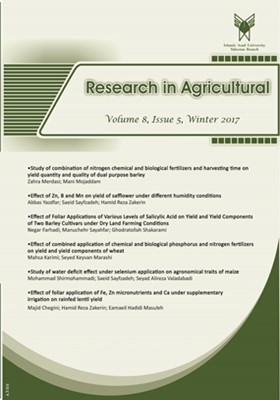Effect of Zn, B and Mn on yield of safflower under different humidity conditions
Subject Areas :Abbas Yazdfar 1 * , Saeid Sayfzadeh 2 , Hamid Reza Zakerin 3
1 - Department of Agronomy, Takestan Branch, Islamic Azad University, Takestan, Iran
2 - Department of Agronomy, Takestan Branch, Islamic Azad University, Takestan, Iran
3 - Department of Agronomy, Takestan Branch, Islamic Azad University, Takestan, Iran
Keywords: Foliar application, Safflower, Irrigation interval, grain oil yield,
Abstract :
The present study was done in order to investigate the effect of Zn, B and Mn on yield of safflower under different humidity conditions in spring and summer of 2015 in Qazvin. This experiment as split plot design as RCBD in 3 replications was conducted. The studied factors included: irrigation interval in 3 levels (I1: irrigation every 6 days, I2: irrigation every 9 days, irrigation every 12 days) as main plot and foliar application in 8 levels (M1: Zn, M2: B, M3: Mn, M4: B Zn, M5: Zn + Mn, M6: Mn + B, M7: B + Zn+ Mn, M8: Water) as sub-plots were considered. Results showed that effects of irrigation and foliar application were significant on grain yield of safflower. The highest grain yield belonged to irrigation every 6 days with mean of 1584 kg/ha and the treatments of irrigation every 9 and 12 days with means of 1438 and 1306 kg/ha had the least grain yield that it were in a common statistically group. The treatment of B + Zn+ Mn with mean of 1579 kg/ha had the most grain yield and the least grain yield was observed in control (water spraying) with mean of 1262 kg/ha.
_||_

